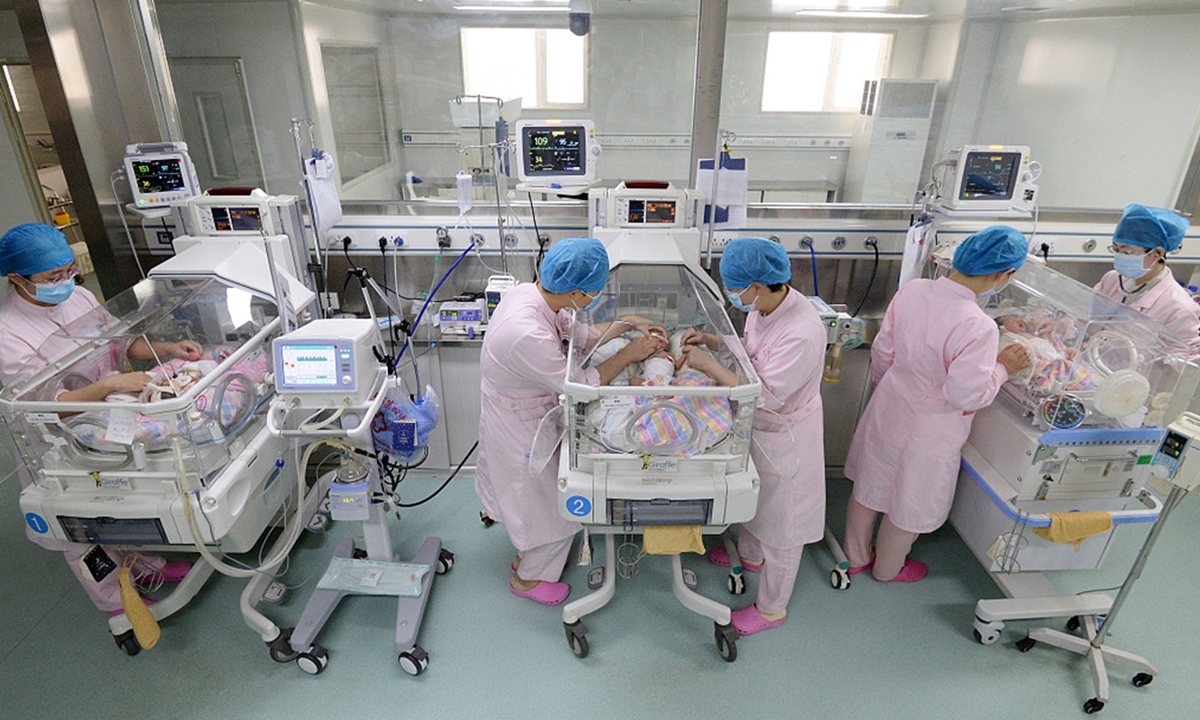
Third-child policy Photo: VCG
Childcare institutions in China are expected to benefit from a series of policies and measures, which will be rolled out to alleviate the difficulties and support the development of childcare industry that has been hard-hit by the impact of the COVID-19 epidemic, as the country was faced with the lowest birth rate in decades last year.
A total of 26 detailed supportive policies and measures from six aspects jointly proposed by government departments including the National Development and Reform Commission and the Ministry of Civil Affairs and the National Health Commission are expected to boost confidence of and motivate the Chinese nursery industry which is still at the early stage of its development but has been affected by the COVID-19 epidemic, related authorities said during a policy briefing held by the State Council Information Office on Thursday.
Du Xixue, commissioner of the department of population surveillance and family development at the National Health Commission (NHC), introduced at the briefing that Chinese childcare institutions are facing difficulties from three aspects.
Firstly, it is difficult for Chinese childcare institutions to lower their operation costs. More than 70 percent Chinese childcare institutions are small- and micro-sized enterprises that have been operating less than three years. The spending on rents and salaries has been increasing year by year, which is a problem that is hard to solve.
Besides, the childcare institutions have been facing difficulties in recruitment during epidemic since infants younger than 3 years old are the most vulnerable group. Meanwhile, they are the always the first batch of business to suspend operation when COVID-19 outbreaks occurred and resume operation later than other industries.
Moreover, childcare institutions lack effective emergency and security measures to combat risks such as major public health events. Most of the institutions of small scale have retreated from the market during the epidemic and the confidence of the industry needs to be restored.
According to Du, childcare institutions have already enjoyed some universal relief supportive measures including reductions of tax, fees, and rents as well as delayed payment of social insurance premiums which were offered to the service sector by the country to cope with the impact of the epidemic.
In addition, some local governments are actively exploring the establishment of financial support mechanisms to support the development of childcare industry through a variety of measures such as special subsidies, tax exemptions, and preferential water and electricity prices.
Du stressed that the various supportive policies and measures for childcare services need to be actively implemented by local and relevant departments.
According to Du, with the joint efforts and active promotion of relevant departments and governments, the childcare service sector has made solid progress under the lead of the NHC. As of the end of 2021, 2.03 children in every 1,000 children aged 3 are in childcare institutions.
Statistics show that more than 30 percent of families with infants and toddlers have strong demand for childcare services whereas most childcare services charges more than families can afford, Du noted.
Since childcare services are closely related to people's livelihood, precise and effective support policies to childcare services can alleviate the problems of nursery institutions in the short term, as well as effectively promote the healthy development of the entire childcare service industry and ensure the effective implementation of the three-child policy in the long run.
Birth data for 2021 released by Chinese provinces and regions showed that the number of new births in 2021 was the lowest in decades in several provinces, and only six among the top 10 provinces with the highest birth numbers exceed 500,000.
The growth rate of China's total population has slowed significantly and is expected to enter a negative growth during the 14th Five-Year Plan period (2021-25), the National Health Commission revealed on the 2022 Annual Conference of China Population Association in July.
Global Times




